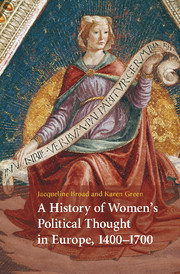Book contents
- Frontmatter
- Contents
- Preface
- Introduction
- 1 Christine de Pizan
- 2 Women of the Italian Renaissance
- 3 From Anne de Beaujeu to Marguerite de Navarre
- 4 Queen Elizabeth I of England
- 5 From the Reformation to Marie le Jars de Gournay
- 6 Women of the English civil war era
- 7 Quaker women
- 8 The Fronde and Madeleine de Scudéry
- 9 Margaret Cavendish, Duchess of Newcastle
- 10 Women of the Glorious Revolution
- 11 Women of late seventeenth-century France
- 12 Mary Astell
- Conclusion
- Bibliography
- Index
10 - Women of the Glorious Revolution
Published online by Cambridge University Press: 02 July 2009
- Frontmatter
- Contents
- Preface
- Introduction
- 1 Christine de Pizan
- 2 Women of the Italian Renaissance
- 3 From Anne de Beaujeu to Marguerite de Navarre
- 4 Queen Elizabeth I of England
- 5 From the Reformation to Marie le Jars de Gournay
- 6 Women of the English civil war era
- 7 Quaker women
- 8 The Fronde and Madeleine de Scudéry
- 9 Margaret Cavendish, Duchess of Newcastle
- 10 Women of the Glorious Revolution
- 11 Women of late seventeenth-century France
- 12 Mary Astell
- Conclusion
- Bibliography
- Index
Summary
In a 1646 letter to René Descartes (1596–1650), Princess Elisabeth of Bohemia (1618–80) defends a ruler's use of extreme violence on pragmatic grounds. When the people are negatively disposed toward political authority, she says, then
large violences are less evil than small ones, because the small do damage as well as the large, and give a subject for a long war; but the large take away the courage for this, as well as the means by which the great will be able to undertake such a war. In the same way, when violences come promptly and all at once, they annoy less than they astonish, and they are also more supportable by the people than is the long series of miseries that civil wars bring.
In this letter, Elisabeth defends the maxims of Niccolò Machiavelli (1469–1527), ‘not as being good in themselves’ but because they ‘all tend to the maintenance of things’ – at least, where the ruler is a usurper. Perhaps these political views are not surprising, coming as they do from the grand-daughter of James I of England. Though his reign was an era of relative peace and religious tolerance, James I himself was an absolutist: he maintained that political rulers are accountable to God alone, and that subjects are never justified in resisting authority. According to this viewpoint, rulers may sometimes be justified in using great severity in order to quash rebellion and maintain the public peace.
- Type
- Chapter
- Information
- A History of Women's Political Thought in Europe, 1400–1700 , pp. 225 - 246Publisher: Cambridge University PressPrint publication year: 2009

